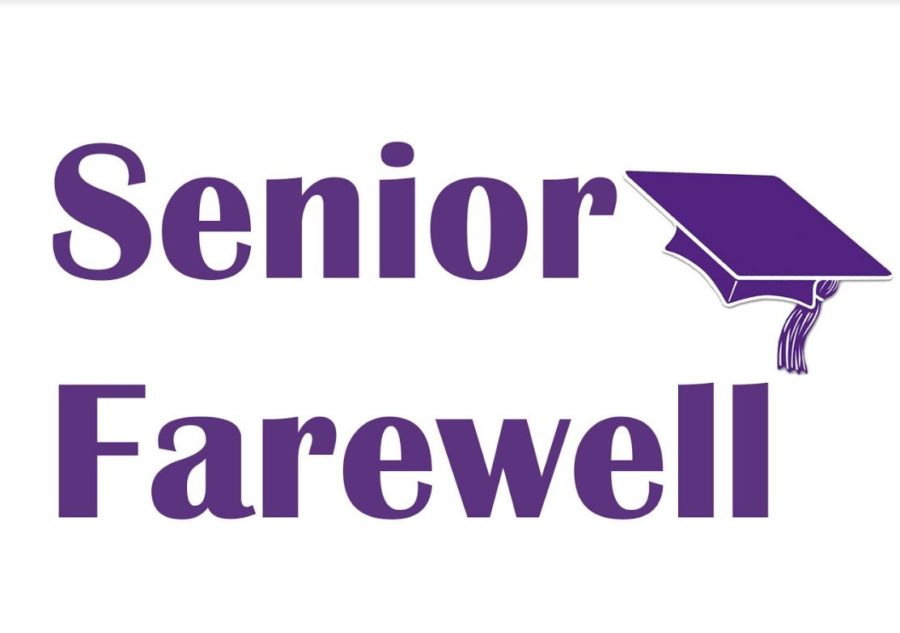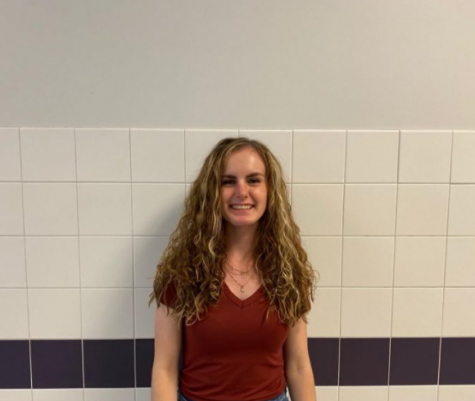Senior Farewell: High school, the worst years of my life
Purbalite seniors evaluate their four years of high school at Baldwin.
May 26, 2022
My four years of high school were without a doubt the worst of my life thus far.
Granted, people might read that and say, “You’ve only lived 18 years.” Well, I hope that in my life I can confidently say that the worst is behind me.
But it wasn’t the people, or the school lunches, or the standardized tests that made these years so difficult. It was mental illness, a topic that I’ve become unwillingly versed in.
Nowadays conversations about mental health are more common than they used to be. With that being said, the stigma around the topic hasn’t changed. It’s still very much taboo.
No one wants to have the conversation. I know I didn’t. I tried to ignore it, thinking that I was just going through a high school phase.
I thought that losing motivation to do the things I loved was just a part of maturing, and that I would gain new interests to replace the ones that I was discarding. No one ever told me that it could be something more than a sign of growing up.
Just like every other Baldwin kid, I had assemblies on A.L.I.C.E., drug addiction, and smoking, but never anything extensive focusing on mental health. So when these thoughts arose, I thought it was normal and that it would pass – because that’s all I had known.
I already did know that I had OCD. From a young age I had been told by a few people that it was undeniable. I would refuse to look out the car window as my dad drove past cemeteries, because if I even so much as peeked, I would blink – and that would mean we would get into a car accident. At restaurants when we had finished our meals and everyone else was gathering their belongings, I would check under the table five times just to make sure no one left anything.
These are only a few examples of what my 8-year-old self comprehended as normal at the time. So for someone to come and tell me that this behavior was far from normal, I was understandably confused.
OCD and anxiety, those were the only two mental illnesses I knew about coming into high school.
No wonder I thought it was normal when I didn’t feel like being on the track team anymore, and when I suddenly became disenchanted with reading and writing, my favorite pastimes.
When COVID-19 appeared, I had been months into the beginning of a long depression. And timing was not on my side. The promise of being isolated for two weeks was scary enough. But when a few weeks turned into months, hope of shaking off this depression became less possible.
I didn’t go on the family walks, and I didn’t dare set foot outside. I didn’t open my curtains, and I never cracked my door as a sign to come in.
When Google Meets and Zoom were introduced, I was already too far gone to care. I stopped attending them after a mere matter of weeks. And if I somehow mustered the energy to type in my password and click a few buttons, I would be asleep within minutes of logging onto a Meet.
So started my downward spiral: My grades began to slip as I couldn’t find the motivation to join a Meet or Zoom call, let alone complete an assignment.
I’m sure my teachers were confused because I had never had issues before. But, you know, it was the “pandemic,” it was affecting everyone, and I would feel all better after this passed.
I waited. I did. I listened for the news that the pandemic was finally going to end.
I waited through the end of my sophomore year, through June and July. I blew off my friends, stopped answering texts, and didn’t go out.
I took a leave from work. I stopped eating three meals and eventually two meals a day. I didn’t have the motivation and I didn’t need the energy. I told myself that if I didn’t wake up at a certain time or actually leave my room that day, I didn’t deserve to eat. And so I didn’t.
And I didn’t sleep. I kept myself awake for nights on end – nights spent in my own terrible thoughts.
Eating and sleeping – basic human instincts for survival – I was ignoring because I didn’t care.
All I had to wait for was Covid to pass.
Then came August and the start of my junior year.
Then September.
And October. October was bad. We were not even a month into school and I was already bombing all my classes. It didn’t make sense because there was the promise of being back in school. There was this looming sense of normalcy that was so close I could almost grasp it. But we didn’t go back that month, and my grades didn’t go back to what they were supposed to be, what I had become accustomed to.
And so I did my research, and to my horror I found something that matched the way I was feeling. And it wasn’t called COVID-19. It wasn’t a pandemic. It was an invisible illness.
In November 2020 I was diagnosed with severe clinical depression. On top of that I was also officially diagnosed with OCD and a minor anxiety disorder.
What is severe clinical depression?
For me, it’s a name for those forced sleepless nights, for my lack of appetite, the inability to get out of bed, the lack of interest, the irritability, and the not wanting to talk at all.
Now, more than a year later, I’ve continued battling my own mind. I’ve made small waves of progress. I’m attending school, eating meals, and sleeping just a little more.
But I refuse to tell anyone that it will get better, because how could I possibly know? In fact, I think saying such a thing is as ignorant as telling someone who has lost someone dear to them that the deceased “are in a better place.”
I won’t sit here and tell anyone that they will wake up tomorrow with a new love for life or the motivation to crawl out of bed.
For those who struggle with a mental illness, every day tends to be a challenge. Weeks of progress may go by, and suddenly a small event can throw that progress out the window. And that’s why I won’t say that it’s been easy.
I’ve fought for where I stand now with myself, and as much as it pains me to admit, I’ve made progress.
I don’t think I’ll ever get back to the person I used to be, and I’ve accepted that. I’ve made progress, and for right now that’s good enough for me.
So no, I won’t say that it gets easier.
I won’t lie and say that there’s a cure or that the pills will wipe away everything. The meds, the therapy, and the rehab can only take it so far.
But believe that it’s possible to get better, even if it’s not a hundred percent, because that hope alone is enough to move mountains.






Diane McMahon • May 28, 2022 at 10:55 am
Such honesty. You have a lot to offer this sad world. Thank you for sharing.
Tara Hutchinson • May 28, 2022 at 12:02 am
You are a brave, beautiful woman, Brooke Scanlon and I love you. Keep moving forward.
Bob King • May 27, 2022 at 11:53 pm
Nice article, Brooke. We love your honesty and love you as you are! ❤️
Jennifer Storms • May 27, 2022 at 5:08 pm
God bless you and your courage to share this! My daughter has been dealing with a similar battle. You don’t know when or if it will get better but hope is the anchor for the soul! One day at a time! This article will undoubtedly help someone, maybe even save someone’s life! I wish you all the best.